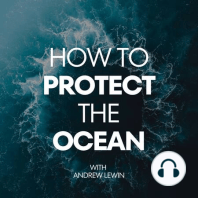16 min listen

The Challenge of Changing Behaviors for Climate Conservation
The Challenge of Changing Behaviors for Climate Conservation
ratings:
Length:
25 minutes
Released:
Apr 12, 2024
Format:
Podcast episode
Description
Andrew Lewin delves into the challenges of changing behaviors to address climate change and conservation issues. Despite alarming climate events, some individuals still deny the urgency for action. Andrew shares personal experiences of trying to change his behavior after indulging in delicious food during a trip to Italy. Tune in to explore the importance of behavior change in conservation efforts. Follow a career in conservation: https://www.conservation-careers.com/online-training/ Use the code SUFB to get 33% off courses and the careers program. Sign up for our Newsletter: http://www.speakupforblue.com/newsletter Facebook Group: https://bit.ly/3NmYvsI Connect with Speak Up For Blue: Website: https://bit.ly/3fOF3Wf Instagram: https://bit.ly/3rIaJSG TikTok: https://www.tiktok.com/@speakupforblue Twitter: https://bit.ly/3rHZxpc YouTube: www.speakupforblue.com/youtube Behavior change is a crucial component of conservation efforts, as highlighted in the podcast episode. The episode underscores the challenges associated with altering people's behaviors, particularly in the face of urgent issues like climate change. Despite the overwhelming evidence of climate change and its adverse effects on the environment, society still encounters significant obstacles in encouraging behaviors that can help mitigate these impacts. The podcast explores how individuals often resist changing their behaviors, even when presented with alarming facts and data about climate change. Some may deny the existence of climate change or downplay its severity, leading to a reluctance to embrace sustainable practices. This resistance to change is further fueled by misinformation propagated by various entities, including businesses and governments, who may have vested interests in maintaining the status quo. Furthermore, the episode delves into the influence of political dynamics on shaping public perceptions and behaviors related to climate change. Political parties may exploit climate change solutions, such as carbon taxes, for their own agendas, resulting in polarization and resistance among the public. This politicization of environmental issues complicates efforts to promote behavior change and sustainable practices. The podcast also touches upon the impact of social norms and peer pressure on shaping individual behaviors. People may feel pressured to conform to societal expectations, even if it means disregarding environmentally friendly practices. This societal pressure can create barriers to adopting sustainable behaviors and contribute to the inertia in changing habits. Overall, the episode highlights the complexity of behavior change in the context of conservation and environmental protection. It stresses the need for collaborative efforts from conservationists, NGOs, businesses, and policymakers to address these challenges and effectively promote sustainable behaviors. By understanding the underlying factors influencing behavior change and implementing targeted strategies, it is possible to overcome resistance and drive positive environmental outcomes. Negative attitudes and misinformation play a significant role in hindering progress toward environmental solutions, such as the implementation of a carbon tax. In the podcast episode, the host discusses how resistance and denial are prevalent when it comes to addressing climate change through behavioral changes like accepting a carbon tax. The episode emphasizes how people often deny the existence of climate change or resist solutions like the carbon tax due to various factors. One major factor is the spread of misinformation, where individuals and organizations, including PR firms and fossil fuel companies, have injected false information into the public discourse. This misinformation campaign has led to confusion and skepticism among the general population, making it challenging to implement effective environmental policies. Moreover, the episode underscores how negative
Released:
Apr 12, 2024
Format:
Podcast episode
Titles in the series (100)
SUFB 056: Warming Oceans Can Cause Dead Zones: Researchers have found that warming oceans after the last glacial period caused massive dead zones in the Pacific Ocean. The Warming Oceans were similar to the temperatures currently in the North Pacific caused by a warming body of water dubbed the... by How To Protect The Ocean